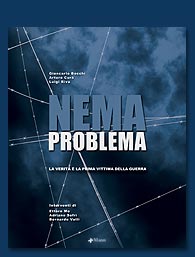
NEMAPROBLEMA
Truth is the first victim of war
The following texts are taken from the book by Giancarlo Bocchi’s film
“NEMAPROBLEMA” – (Manni Editore)
(…)“watching
Giancarlo Bocchi’s film was like reading one of those short stories,
essential and to the point where no word is superfluous: for this
reason the story, like the film, captivates and allures you, generating
deep emotions. (…) the director, who is well acquainted with the area
and knows the work of correspondents, has been objective. There
actually were unfounded reports, scoops which were never verified, and
also interviews which were made-up. Yet the tone of his denunciation is
neither indignant nor moralizing; it is simply a reflection, as is
expressed by one of the film’s main characters when he says; “truth is
the first victim of war” (…)
Ettore Mo
(Writer and special correspondent for “Il Corriere della Sera “)
(…)“when
in a critical situation, a journalist must above all be a witness, who
describes the facts after having tried to verify them, where it is
possible to do so. Many cheat. I’ve read lots of newspapers that
overflow with stories which are made up, and I’ve watched a lot of
phoney television news. (…) But as far as journalism is concerned, it’s
said that anyone who writes rubbish is “writing a novel”. It’s no
compliment. But it’s not that simple either.
(…) A novelist can
be a witness with less scrupules, but be more effective and closer to
the truth on the essential facts than a reporter who is too pedantic
(…) Through invented details, they (the novelists) succeed in
portraying a sense, and a meaning to a situation. In substance they are
transmitting the essential. The truth that counts. This is a very
difficult task for those of us who are prisoners of the truth of the
moment, a truth that changes from one minute to the next, leaving you
with many details that may be precise yet worthless. It’s the
unrewarding fate of the honest artisan, which is what a good reporter
is”(…)
Bernardo Valli
(Journalist and special correspondent for “La Repubblica”)
(…)
In this engaging, fast-paced and to-the-point film, intrigue is the
supreme ruler, and transforms all the factions and the characters into
pathetic puppets. With authentic simplicity each faction, each
character is the holder of his own particular lie, fraud, bragging, and
corruption– in fact, one can openly be a lier or a swindler and at the
same time be sentimental about it – but the result is an unfavorable
providence of some sort: everything conspires to the conquest of evil,
it’s an evil that has no grandeur nor banality, an evil which is both
common and contagious.
A script on the Balcans, perhaps, or that
could already be regarded as universal: nema problema, on the desolate
planet of today. (…)
Adriano Sofri
(Writer, opinion columnist for “Panorama” and “ La Repubblica”)
Nema Problema is a journey, a run through time not to flee, but to search.
There is only one question in this war-torn world: which is the truth?
Are there any rights to the truth?
I did not want to make a “war film”, nor the “usual” film about war in
the Balkans. I wanted to make a film “inside” the war.
I also wanted to tell about everyone’s day to day reality and how it is
distorted ; and how through countless “screens” it turns into
“fiction”, it becomes the “grand illusion”.
On the one hand, I thought of a realism, free of any superstructures,
and on the other a research in the narration which revealed its many
levels, and the complexity of what it wanted to represent.
It appears that the story does not have a single protagonist, because
the real protagonist – Commander Jako – is never seen, but reigns
supreme as the “internal director” of the story.
In this sense, “fiction” is subsequently wiped out and replaced by other internal narration.
There are no heroes nor winners in this film: a long sequence of little
truths and big lies conducted by the characters tossed around by
obscure and tragic events, remaining in a perpetually unstable
equilibrium between truth and falsehood.
It has been written, “Truth is the first victim of war…”.
This is true, if one lacks the courage to search for the truth, not
only from the outside, but also from within ourselves.
Giancarlo Bocchi